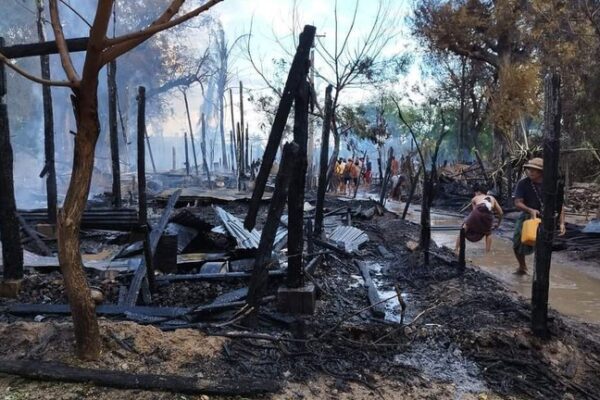
China to reach renewable power goal 5 years early, report says
The boom in renewable power projects in China will likely help the country reach its 2030 target five years early, boosting the effort to limit global carbon emissions far faster than expected, a new study said. China is on track to double its solar and wind power capacity and shatter Beijing’s ambitious 2030 target of 1,200 gigawatts (GW) five years ahead of schedule if all prospective projects are successfully built and commissioned, said the Global Energy Monitor (GEM) report, released on Thursday. Solar panel installations alone are growing at a pace that would increase global capacity by 85% and wind power by nearly 50% by 2025, said GEM, a San Francisco-based non-governmental organization that tracks energy projects worldwide. China has approximately 379 GW of large utility-scale solar and 371 GW of wind capacity projects that have been announced or are in the pre-construction and construction phases. They will likely be finished by 2025, adding roughly the same amount of currently installed operating capacity. The report projected that China would likely achieve the provincial targets of approximately 1,371 GW for wind and solar, which is higher than the 1,200 GW President Xi Jinping announced his government would install by 2030. A solar panel installation is seen in Ruicheng County in central China’s Shanxi Province, Nov. 27, 2019. Credit: AP “This new data provides unrivaled granularity about China’s jaw-dropping surge in solar and wind capacity,” said Dorothy Mei, project manager at Global Energy Monitor. “As we closely monitor the implementation of prospective projects, this detailed information becomes indispensable in navigating the country’s energy landscape.” Half global renewable capacity in China China has emerged as the frontrunner in global renewable energy, leveraging a blend of incentives and regulatory policies to host approximately 50% of the world’s operational wind and solar capacity. The report said the ambitious renewable push has been geographically widespread, with every province and most counties developing large-scale solar and wind power. China’s operating scale solar capacity has reached 228 GW, more than the rest of the world combined. This map shows prospective large utility-scale solar capacity in China. Credit: Global Energy Monitor. According to the report, China’s northern and northwest provinces have the largest number of solar projects. Shanxi, Xinjiang, and Hebei are the top three regions with the highest utility-scale solar capacity. Meanwhile, China’s combined onshore and offshore wind capacity has doubled since 2017, surpassing 310 GW, with the highest concentration of projects in the northern and northwestern regions, including Inner Mongolia, Hebei, and Xinjiang. China’s offshore wind capacity, which accounts for just 10% of its total wind capacity, is more than Europe’s offshore operating capacity. This map shows prospective wind farm capacity in China. Credit: Global Energy Monitor. On Sunday, China successfully commenced operations of the Tibetan plateau’s largest hybrid solar-hydro power plant, Kela, which can generate 2 billion kilowatt hours of electricity annually, equivalent to the energy consumption of over 700,000 households. Currently boasting a capacity of 20 GW, the plant is projected to expand and achieve approximately 50 GW capacity by 2030. In the past, China has said that its greenhouse gas emissions will peak in 2030 before slowing down to reach net zero by 2060. “Ramping up wind and solar capacity plays an essential role in China’s carbon emissions from the power sector,” Mei told Radio Free Asia. “When China reaches its emissions peak will essentially depend on how soon the growth of clean energy can start to outpace the increase in total energy demand, which could happen in the next few years given the current solar and wind boom.” China’s reliance on coal continues Among the top 10 power sector emitters, China led the world by three times more than the U.S., the second-biggest carbon dioxide emitter, with fossil fuel power plants generating two-thirds of China’s electricity in 2022. In April, another energy research organization Ember said in a report that China produced the most CO2 emissions of any power sector in the world in 2022, accounting for 38% of total global emissions from electricity generation. Mei said that while China had made significant progress in renewable energy deployment, it continued to heavily rely on coal for power generation “due to its reliability and consistent electricity supply.” “The power supply model being adopted at the renewables bases in the northwest deserts still largely relies on new coal power plants to provide a steady, reliable flow of electricity through the long-distance direct current transmission lines to end users,” Mei said. In 2022, China alone accounted for 53% of the world’s coal-fired electricity generation, showing a dramatic revival in appetite for new coal power projects. A View of the Wujing coal-electricity power station is seen across the Huangpu River in the Minhang district of Shanghai on August 22, 2022. Credit: Hector Retamal/AFP Recent record heatwaves and drought have also renewed focus on China’s energy security concerns, as factories had to be shut down due to power shortages, forcing authorities to increase reliance on coal. Last year, Beijing approved the highest new coal capacity in eight years. It continues this year, with environmental group Greenpeace saying in April that China had approved at least 20.45 GW of new coal capacity in the first three months of 2023, according to official approval documents. “As electricity demand during extreme weather events increases, China must resist turning to coal and should instead prioritize more optimal solutions to manage the variability of demand and clean power supply,” Mei said. Edited by Mike Firn.







